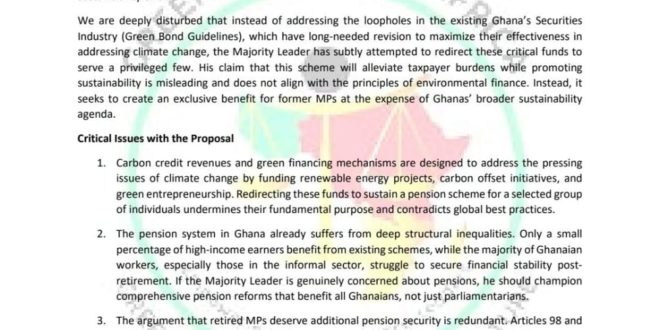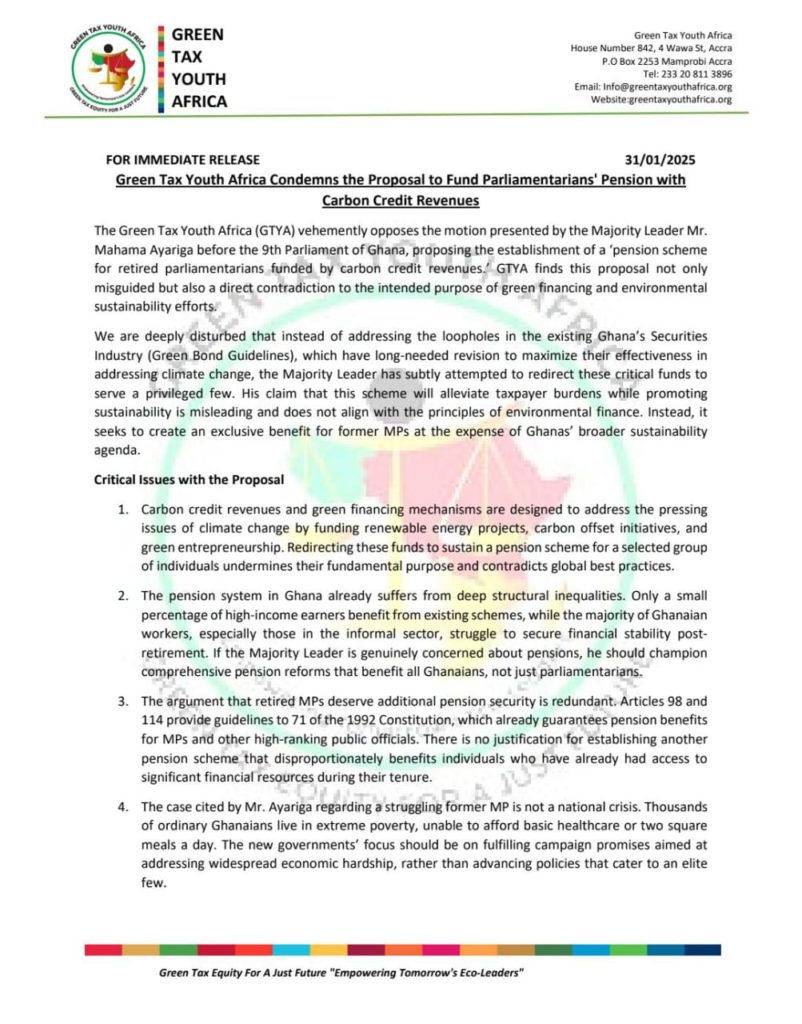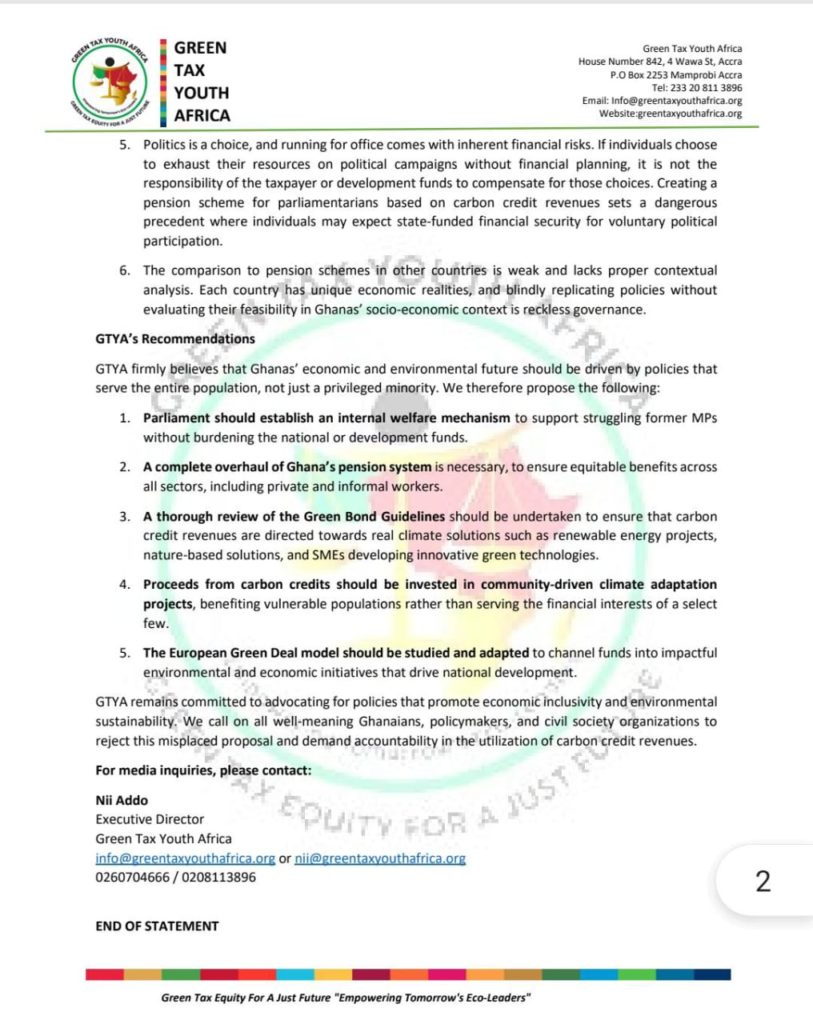The Green Tax Youth Africa (GTYA) is pushing for a thorough review of the country’s Green Bond Guidelines to ensure that carbon credit revenues are directed towards real climate solutions instead of the establishment of a ‘pension scheme for retired parliamentarians funded by carbon credit revenues.
This comes after Majority Leader, Mahama Ayariga proposed the establishment of a ‘pension scheme for retired parliamentarians funded by carbon credit revenues.’
According to the group, Parliament should rather establish an internal welfare mechanism to support struggling former MPs without burdening the national or development funds.
Below is the full statement:
GREEN TAX YOUTH AFRICA CONDEMNS THE PROPOSAL TO FUND PARLIAMENTARIANS’ PENSION WITH CARBON CREDIT REVENUES
The Green Tax Youth Africa (GTYA) vehemently opposes the motion presented by the Majority Leader Mr. Mahama Ayariga before the 9th Parliament of Ghana, proposing the establishment of a ‘pension scheme for retired parliamentarians funded by carbon credit revenues.’
GTYA finds this proposal not only misguided but also a direct contradiction to the intended purpose of green financing and environmental sustainability efforts.
We are deeply disturbed that instead of addressing the loopholes in the existing Ghana’s Securities Industry (Green Bond Guidelines), which have long-needed revision to maximize their effectiveness in addressing climate change, the Majority Leader has subtly attempted to redirect these critical funds to serve a privileged few. His claim that this scheme will alleviate taxpayer burdens while promoting sustainability is misleading and does not align with the principles of environmental finance. Instead, it seeks to create an exclusive benefit for former MPs at the expense of Ghana’s broader sustainability agenda.
Critical Issues with the Proposal
1. Carbon credit revenues and green financing mechanisms are designed to address the pressing issues of climate change by funding renewable energy projects, carbon offset initiatives, and green entrepreneurship. Redirecting these funds to sustain a pension scheme for a selected group 1of individuals undermines their fundamental purpose and contradicts global best practices.
2. The pension system in Ghana already suffers from deep structural inequalities. Only a small percentage of high-income earners benefit from existing schemes, while the majority of Ghanaian workers, especially those in the informal sector, struggle to secure financial stability postretirement. If the Majority Leader is genuinely concerned about pensions, he should champion comprehensive pension reforms that benefit all Ghanaians, not just parliamentarians.
3. The argument that retired MPs deserve additional pension security is redundant. Articles 98 and 114 provide guidelines to 71 of the 1992 Constitution, which already guarantees pension benefits for MPs and other high-ranking public officials. There is no justification for establishing another pension scheme that disproportionately benefits individuals who have already had access to significant financial resources during their tenure.
4. The case cited by Mr. Ayariga regarding a struggling former MP is not a national crisis. Thousands of ordinary Ghanaians live in extreme poverty, unable to afford basic healthcare or two square meals a day. The new governments’ focus should be on fulfilling campaign promises aimed at addressing widespread economic hardship, rather than advancing policies that cater to an elite few.
5. Politics is a choice, and running for office comes with inherent financial risks. If individuals choose to exhaust their resources on political campaigns without financial planning, it is not the responsibility of the taxpayer or development funds to compensate for those choices. Creating a pension scheme for parliamentarians based on carbon credit revenues sets a dangerous precedent where individuals may expect state-funded financial security for voluntary political participation.
6. The comparison to pension schemes in other countries is weak and lacks proper contextual analysis. Each country has unique economic realities, and blindly replicating policies without evaluating their feasibility in Ghanas’ socio-economic context is reckless governance.
GTYA’s Recommendations
GTYA firmly believes that Ghanas’ economic and environmental future should be driven by policies that
serve the entire population, not just a privileged minority. We therefore propose the following:
1. Parliament should establish an internal welfare mechanism to support struggling former MPs without burdening the national or development funds.
2. A complete overhaul of Ghana’s pension system is necessary, to ensure equitable benefits across all sectors, including private and informal workers.
3. A thorough review of the Green Bond Guidelines should be undertaken to ensure that carbon credit revenues are directed towards real climate solutions such as renewable energy projects, nature-based solutions, and SMEs developing innovative green technologies.
4. Proceeds from carbon credits should be invested in community-driven climate adaptation projects, benefiting vulnerable populations rather than serving the financial interests of a select few.
5. The European Green Deal model should be studied and adapted to channel funds into impactful environmental and economic initiatives that drive national development.
GTYA remains committed to advocating for policies that promote economic inclusivity and environmental
sustainability. We call on all well-meaning Ghanaians, policymakers, and civil society organizations to
reject this misplaced proposal and demand accountability in the utilization of carbon credit revenues.
THANK YOU for constantly reading stories on MyGhanaMedia.com, a news publishing website from Ghana. Kindly like, follow, comment, and SHARE stories on all social media platforms for more entertaining updates!
Follow us on Twitter: https://twitter.com/
Source: MyGhanaMedia.com
There are four types of content published on MyGhanaMedia.com daily: curated content; syndicated content; user-generated content; and original content.
 MYGHANAMEDIA.COM Best Source Of Latest News
MYGHANAMEDIA.COM Best Source Of Latest News








